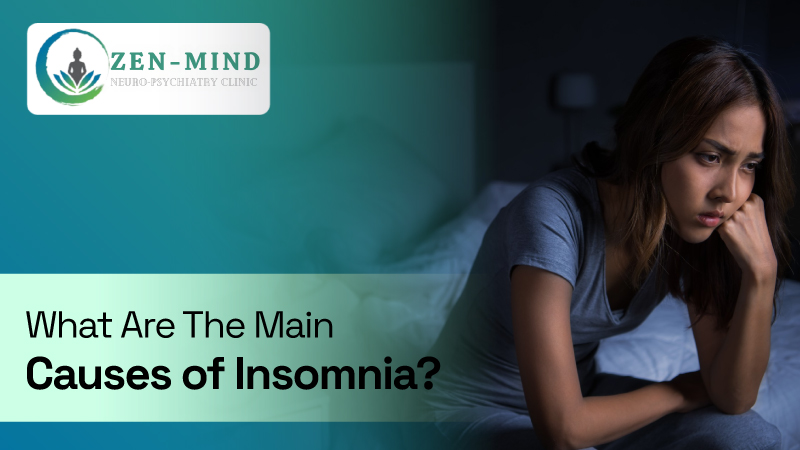What Are The Main Causes of Insomnia?
Can’t sleep at night, no matter how many times you flip your pillow to the cold side? Or do you find yourself staring at the ceiling, replaying your to-do list from ten years ago? If that sounds like you, you might be dealing with insomnia, and the next step you should take is to visit Zen-Mind Neuro-Psychiatry clinic for Insomnia Treatment in Ahmedabad. You’re not alone—millions of people across the globe struggle with this frustrating sleep issue.

What is Insomnia?
Insomnia is a sleep disorder characterised by difficulty falling asleep, staying asleep, or waking up much earlier than desired, yet being unable to return to sleep. It’s not just a few hours of sleep you’re losing here, it can impact your mood, energy levels, and ultimately your health. While the odd night without sleep is pretty normal, if you find yourself struggling to sleep, night after night, something might be up.
Now, before we jump into remedies, let’s get to the heart of the problem: what’s actually keeping you awake at night? Understanding the causes of insomnia can help you figure out what’s wrong and how to fix it. So, let’s break it down in plain English.
1. Stress – The Overactive Mind
We’ve all been there: tossing and turning in bed, thoughts relentlessly whirring, as if our minds had downed three cups of black coffee. Stress is one of the most common causes of sleeplessness. Whether it’s work deadlines, relationship drama, or, yes, fretting about the fact that you can’t sleep (that good old vicious cycle), stress is truly the enemy of your brain's ability to shut off. When your body makes gobs of cortisol — the stress hormone — it becomes great at keeping you in fight-or-flight mode, unable to relax when it’s finally time to catch some snoozing.
2. Poor Sleep Habits
Your bedtime routine matters more than you think. Scrolling on your phone in the dark, binge-watching Netflix until 2 a.m., or drinking too much coffee in the evening can all disrupt your sleep schedule. These poor habits are sneaky causes of insomnia because you don’t even realise how much they’re affecting you. If your body clock is confused, falling asleep becomes an uphill battle.
3. Anxiety and Depression
Mental health is a big aspect of good sleep. Anxiety can set worries spinning through your head continuously; depression can mess up your sleep schedule beyond recognition. For some, it’s difficult to fall asleep; for others, it’s waking up at strange hours. Either way, these mental health issues are a frequent source of insomnia and should not be overlooked.
4. Medical Conditions and Medications
Sometimes the issue isn’t simply in your head — it’s in your body. Conditions like asthma, arthritis, acid reflux or chronic pain can make it difficult to feel comfortable at night. And some medications, such as those for high blood pressure, allergies — or, yes, even antidepressants — can disrupt sleep. These problems are frequently unnoticed, yet are legitimate reasons for sleepless nights that require a doctor’s treatment.
5. Lifestyle Choices
And let’s face it, some of your daily habits could be ruining your sleep. Late-night heavy meals, an over-reliance on energy drinks, smoking, or erratic sleep schedules can all throw your internal clock off balance. Even working out too close to bedtime, for example, can have the effect of pumping up your adrenaline and keeping you awake. So yes, lifestyle choices are some of the most common causes of insomnia, but luckily, they’re also the easiest to fix with small changes.
6. Environmental Factors
Think your bedroom doesn’t matter? Think again. A loud neighbourhood, an overabundance of light sneaking through the curtains, or a rock-hard mattress can all ruin your sleep. Environmental factors are an underrated cause of insomnia, but many times they are easy to address with blackout curtains, white-noise machines, or a more comfortable mattress.
7. Hormonal Changes
A graver form of psychotic disorder, schizophrenia, affects thinking, emotions and the perception of reality. Individuals may experience hallucinations, delusions and disorganised thoughts. With treatment, including medication and therapy, many leHormones have a massive impact on how well and in what state we sleep. Pregnancy, at menopause and monthly cycles are some of the times when women can feel this side effect. Testosterone levels can also impact sleep quality for men. Hormonal fluctuations are normal, but they’re another underappreciated contributor to insomnia and may help explain those awakenings.
Wrapping It Up
Not being asleep is not simply the same thing as “not feeling sleepy.” It’s a sign that something in your head, body, or life is off. There are many reasons you might have trouble sleeping, ranging from stress and anxiety to underlying medical issues to just plain bad sleep habits, and they’re not always the same from person to person.
Searching for something positive? Now that you know what’s keeping you awake, you can find a way to fix it. So whether that’s establishing a solid nighttime regimen, reducing your caffeine intake, managing your stress levels or talking to professionals at Zen-Mind Neuro-Psychiatry Clinic about medical concerns, better sleep is possible.
So next time you find yourself counting sheep at 3 a.m., remember: understanding the causes of insomnia is the first step toward finally getting that deep, peaceful sleep your body craves.